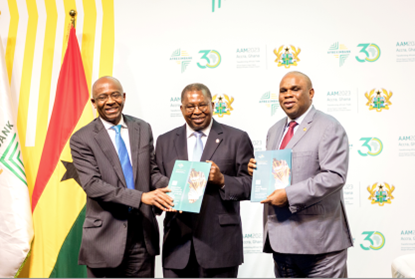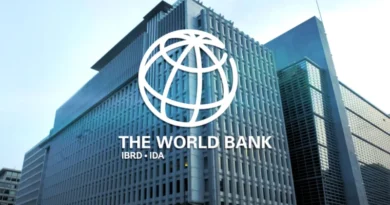African Export-Import Bank Launches 2023 African Trade Report, Highlighting Africa’s Resilient Growth Amid Global Challenges
The African Export-Import Bank (Afreximbank) unveiled the 2023 edition of the African Trade Report (ATR2023) during its Annual Meeting – AAM2023 and 30th Anniversary celebrations in Accra, Ghana.
Professor Benedict Oramah, the President and Chairman of the Board of Directors of Afreximbank, launched the ATR2023 alongside HE Ambassador Albert Muchanga, the African Union Commissioner for Economic Development, Trade, Industry, and Mining. During the launch, Prof. Oramah emphasized that Africa has demonstrated growth resilience in the face of various global challenges, including the lingering effects of the Covid-19 pandemic, record-high inflation, geopolitical tensions, and trade wars.
Despite these headwinds, Africa remained on a growth trajectory, with its GDP increasing by 3.9% and merchandise trade expanding by 20.9% in 2022, surpassing the global average of 12%, as stated in the report.
Dr. Hippolyte Fofack, Afreximbank’s Chief Economist, attributed the region’s strong trade performance to favorable commodity terms of trade, with rising commodity prices offsetting lackluster growth in global trade volumes, which increased by 2.7%.
However, Dr. Fofack cautioned that the recurrence of adverse commodity terms of trade shocks poses a significant risk to the continent, as over 80% of African countries remain highly dependent on commodities. He emphasized the need for Africa to integrate global value chains (RVCs) through backward activities and move away from the colonial development model focused on resource extraction.
The 2023 African Trade Report focuses on the theme of “Export Manufacturing and Regional Value Chains in Africa under a New World Order.” The report highlights the importance of accelerating the structural transformation of African economies and argues that the current African and global environment, driven by the implementation of the African Continental Free Trade Agreement (AfCFTA) and the realignment of global supply chains, is conducive to the development of RVCs for export manufacturing-led growth in Africa.
Export manufacturing-led growth has historically played a pivotal role in global income convergence, facilitating technology transfers and the development of RVCs for effective integration into global value chains (GVCs).
Dr. Fofack emphasized that while extra-African trade is dominated by primary commodities, manufactured goods dominate intra-African trade. Leveraging this intra-African trade in manufactured goods could catalyze industrialization and the development of RVCs within the AfCFTA era. The report advocates for proactive support for the implementation of the AfCFTA to boost manufacturing output and expedite structural transformation, given the realignment of global supply chains and the shift towards “friend-shoring.”
Mr. Donald Kaberuka, former President of the African Development Bank, supported this stance, highlighting in an article published in Foreign Affairs on 18th May 2023 titled “The global economy’s future depends on Africa” that Africa possesses the world’s youngest population, with 70% under the age of 30. This young demographic presents an opportunity for structural transformation and export diversification, provided they are empowered and given the necessary opportunities for work and innovation. The report calls on African governments to invest in human capital development, infrastructure, research, and digital capabilities.
In conclusion, Prof. Oramah urged for the timely conclusion of negotiations on rules of origin that prioritize local value addition. Such rules are crucial for technology transfer and the development of RVCs, enabling Africa to diversify its sources of growth and enhance its effective integration into the global economy under the new world order.
HE Ambassador Albert Muchanga praised Afreximbank’s support and commitment to diversifying African exports, making it one of the most significant development finance institutions in the continent. He recommended that everyone read the African Trade Report 2023 as it provides timely insights and articulates policies and options to set Africa on an irreversible path of sustainable structural transformation and increased global growth and trade share.



